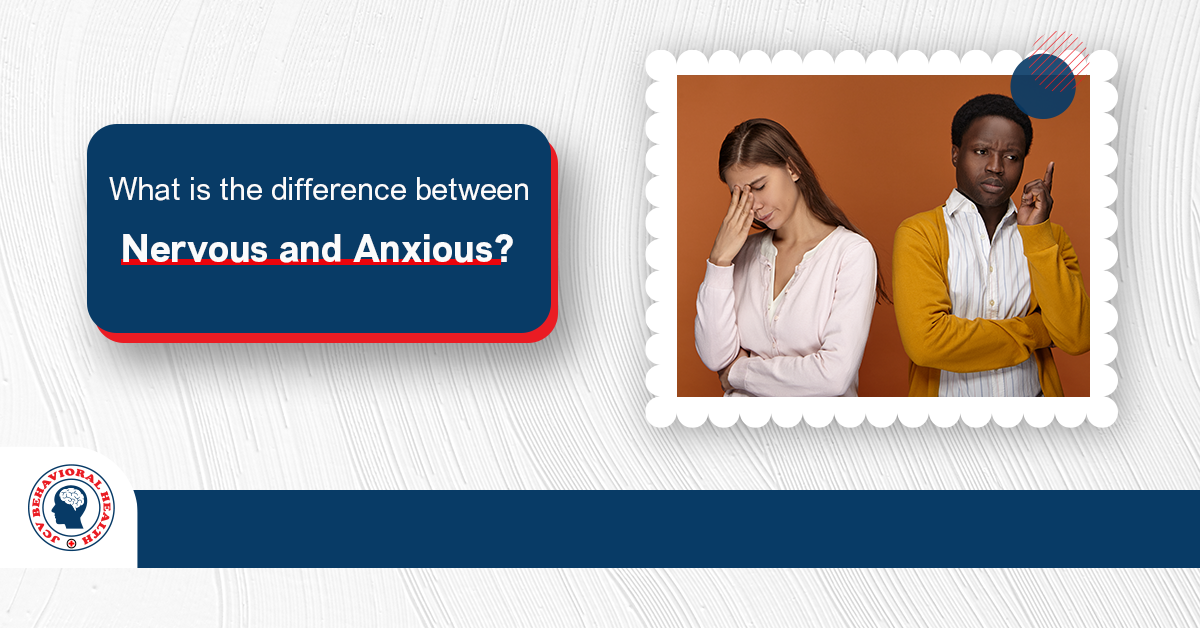We all feel uncomfortable at times. Do you know the difference between nervous and anxious feelings? These emotions seem similar, but there are key differences. We’ll simplify these meanings so even a fifth-grader can understand. We’ll look at how people use the terms “nervous” and “anxious,” and how they influence each other. Interested in these emotions? Read on!
JCV Behavioral Health helps you understand the difference between nervous and anxious feelings. Let us guide you toward managing anxiety and building a healthier mindset. Contact us today.
Defining Nervousness and Anxiety
Let’s clarify a couple of things before we define nervousness and anxiety; let’s understand what they mean.
Imagine you’re about to make a speech or go to a big meeting; you might feel a sense of nervousness. This feeling? It tends to fade away once the particular event is done. Take an exam, for instance; you’re anxious beforehand, but once you’ve finished, the feeling dissipates. So, what is nervous? It’s a passing emotion linked to a specific circumstance.
Contrarily, anxiety isn’t just a fleeting reaction to some occurrence. It is a lasting sensation of fretfulness or dread that doesn’t necessarily subside with shifts in circumstances. Pinpointing the causes of anxiety can be a puzzling task at times. When this feeling escalates or continues, indeed, it may disrupt everyday activities. Questions like, “Is anxious and anxiety the same?” might have crossed your path. While related, anxiety is more potent and tends to persist longer than a simple feeling of nervousness.
Is Anxious and Anxiety the Same?
People often wonder, “Is anxious and anxiety the same?” They’re different. Being anxious is an emotion, linked with nerves. But, anxiety is more severe, lingering. In essence, anxiety is an intense form of feeling anxious. When someone’s anxious, maybe they’re stressed about a nearing event, such as a test or major life change. Yet, anxiety is more intense, making relaxation tough, even if there’s no apparent cause for concern.
So, the difference between nervous and anxious? They’re not the same. When you’re nervous, it’s usually about a specific thing, and it doesn’t last long. But anxiety? That can stick around. And what’s tricky is that there isn’t always a clear reason why.
Nervousness vs. Anxiety
Recognizing the difference between nervousness and anxiety is critical. This understanding lets people pinpoint their emotions and seek assistance when necessary. Here are the prominent contrasts between these feelings:
-
Duration
Feeling nervousness is short-lived; it fades when an event finishes. Yet, anxiety lingers. Depending on one’s situation, it can hang around for days, weeks, or longer.
-
Cause
Nervousness commonly has a definable source. Like feeling on edge before a crucial exam. Anxiety might lack an identifiable source and can sneak up even when everything seems alright.
-
Intensity
Generally, anxiety hits harder than simple nervousness. Feeling nervous often leads to sweating or a sensation in your stomach like butterflies. Anxiety, however, sometimes triggers panic attacks, chest pain, or trouble breathing.
-
Impact
Being nervous mostly doesn’t stop you from getting stuff done. You may be a bit shaky, but you still manage. However, anxiety can hold you back from simple daily tasks and affect how you enjoy life.
How the Nervous System Plays a Role
You may have heard the terms anxiety and nervous system together. They are connected. The nervous system controls anxiety and nervous feelings. When overcome by anxiety or nerves, your body responds. It gets ready to “fight or flight.” This could lead to things like a fast-beating heart, sweating, or trembling. If it gets really bad, stress-invoked panic attacks can arise from anxiety.
Wonder how our nervous system stirs up feelings? When we’re under stress, our nervous system sends alerts to our brain. These alerts are brief when we are nervous. But with anxiety, here’s the kicker: our system remains on edge even after the stress has passed. This makes calming down a real challenge.
When Nervousness Becomes Anxiety
Knowing the line between nerves and anxiety is essential. Suppose you’re often scared or anxious without a clear cause. This continuous worry could be a sign that your nerves have morphed into anxiety. At such times, asking a mental health expert for help might really aid in handling your feelings.
A lot of people ask, what is the difference between anxiety and nervousness? Anxiety is heavier, with lasting impacts on your wellness. On the other hand, nervousness is temporary, though not easy. When those nervous jitters stick around and don’t fade, that might signal anxiety.
Nervous or Anxiety: How to Tell the Difference
Understanding if you’re nervous or anxious can be tough. Let’s simplify it:
- You feel nervous before an event, like a work meeting or a first date. It fades after the event.
- Anxiety pops up anytime, often without an explicit reason. It may stop you from taking pleasure in your hobbies, making you feel overwhelmed.
Keep in mind that everyone experiences nerves and worry from time to time. Yet, the impact varies. For instance, one might occasionally feel nervous, whereas another might regularly tackle anxious feelings.
What Does Anxious Mean?
So, we’ve discussed nerves and anxiety. Let’s delve into what ‘anxious’ means. Questioning what the word anxious means? It’s about dreading or fearing what might occur later. For example, you could be anxious prepping for a major exam, tightly linked to an event.
But don’t mix feeling anxious with having anxiety. The uneasiness fades after the tense happening, as opposed to anxiety, which tends to linger, making unwinding tough.
Coping with Nervousness and Anxiety
Grasping the difference between feeling nervous and anxious can simplify your emotional control. Check out these strategies for dealing with such feelings:
- Deep Breathing: If you’re nervous or anxious, deep breathing exercises can soothe both the body and mind.
- Exercise: Less stress comes from physical activity; it can control anxiety.
- Mindfulness: Concentrating on the now through things like meditation can stop the anxiety from getting too much.
- Talk to Someone: At times, a casual conversation with a friend or relative about your emotions can reduce the strain on your mental health. When anxiety is extreme, a therapist’s chat can help you find ways to manage it.
Conclusion
It’s key to know the difference between nervous and anxious. This can help us handle our feelings better. Nervousness usually doesn’t last long and is linked to certain events. But anxious feelings can stick around and mess with daily life. By figuring out how to deal with these emotions and spotting when they get too much, we can boost our minds’ health and happiness.
Knowing these emotions and their differences helps you recognize your feelings. This makes it easier to take necessary actions. Try deep breathing, exercising, or talking to a pro to ease anxiety.
FAQs
Q. What is the difference between nervous and anxious?
Feeling nervousness is a brief sensation tied to things like tests or special occasions. On the other hand, anxiety is more lasting and might occur without a straightforward cause.
Q. Is anxious and anxiety the same?
No, being anxious is a fleeting feeling, whereas anxiety is stronger and can persist for an extended period.







